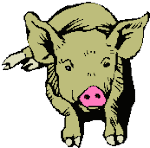At last, a sensible report, from "The Yorkshire Post" breaks the silence in Britain. This does not casually dismiss Schmallenberg Virus ( SBV ) as harmless to human health.
Defra and its veterinarians have obviously now brought their PR people under proper control and stopped them briefing the media with veterinary puff.
Current discussions with the government about new veterinary disciplinary procedures bring their benefits.
They are now well on the way to regarding the midges as a theory rather than a fact ( it was mosquitoes, anyway, probably a mistranslation somewhere) and other remarks suggests that, live imports, the real source of CSF and FMD in 2000, long widely suspected in farming circles, has resurfaced as a likely route for the import of disease to Britain.
The second report, from Wales, below too, shows a similar grasp of reality.
Things have become so serious now, that group solidarity takes second place to real science. "You can fool some of the people…"
How different things would have been had Britain's corrupt government veterinarians told the truth in 2000-2001.
The reality of live imports as a probable source, known earlier, would have changed livestock farming in ways that would have helped protect human health, worldwide.
As it was, the world was misled on a significant scale to cover-up British veterinary incompetence, fraud and greed.
Anyway, very bad news, but now handled in a professional way.
The Yorkshire Post report here
and Wales Online here
